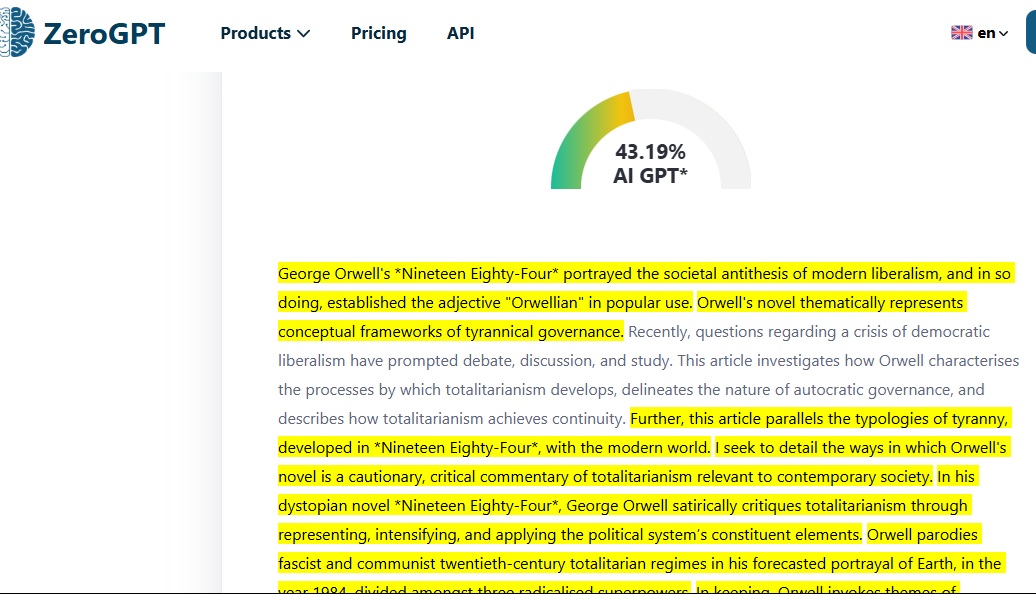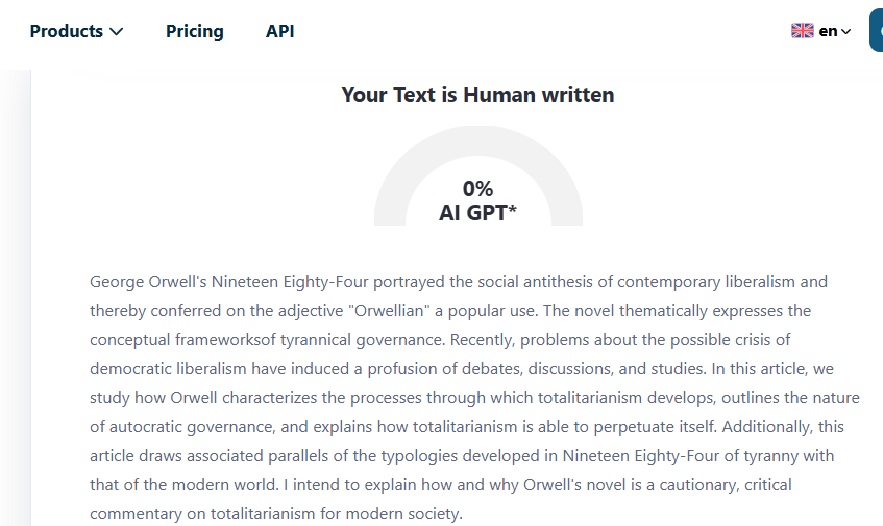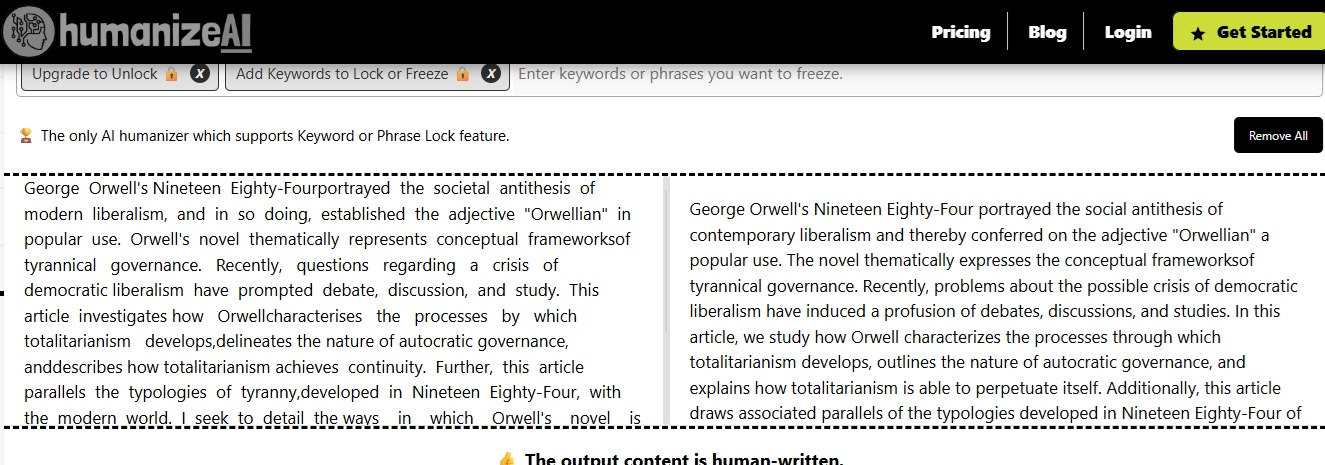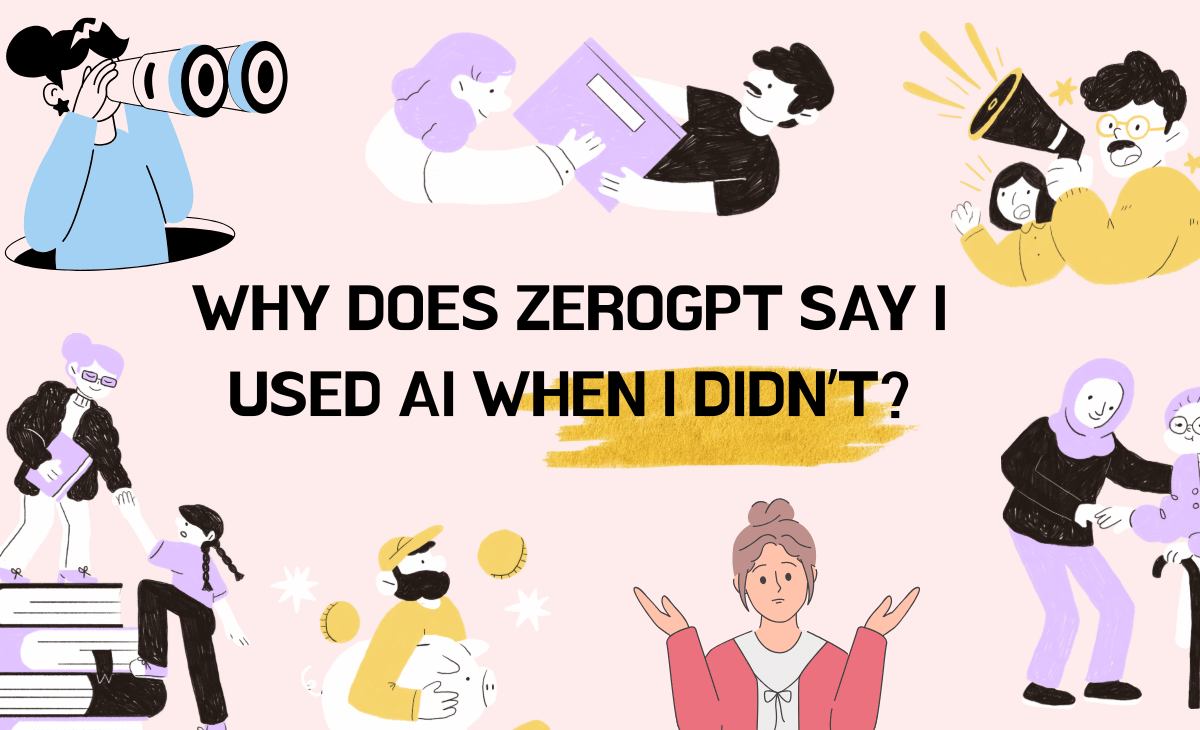Before you start doubting yourself and have a meltdown wondering why ZeroGPT says you used AI, I need you to relax. First things first, you should know that ZeroGPT has done this to every other writer who writes in more precise and direct tones.
That is the problem with a tool like ZeroGPT: it doesn't understand what’s AI and what’s human; all it knows are patterns and phrases. To put it in simpler terms, ZeroGPT only knows what needs to be flagged, but has no contextual awareness.
So, if you are someone who has never used an AI tool in their life, you can also be under its radar and be prosecuted just for writing like one. Now, this dubious nature of ZeroGPT has created an unstable situation for students, marketers, and writers in general.
They are facing rejections from dream colleges, their ideal clients, and so on, as not everyone likes to read and favor AI-generated content. The situation has now truly escalated to a point that it needs an intervention, and soon. But how can one intervene with an AI detector that works independently? Let us begin by understanding how it works first.
How ZeroGPT Works (In Simple Terms)
As you know, with ZeroGPT, all one needs to do is copy and paste a piece of text, and it will detect the presence of AI in seconds. However, the technicalities are a bit more complicated than this.
Now, ZeroGPT relies on something known as DeepAnalyse™ Technology, which is a pioneer in AI detection. The tool promises to be an excellent detector for ChatGPT, GPT-3, GPT-4, Gemini, and LLaMa models.
The working process of ZeroGPT includes looking at big patterns to tiny details to make sure it can trace the text’s rightful origin. They trained it using a mix of real writing from the internet, educational materials, and specially made AI content created using many different AI models.
Even though they promise an accuracy of 98% in their setup, there is a problem: ZeroGPT tends to diverge from this narrative. It tends to flag an original piece of content and eventually makes us question its credibility.
Here’s a quick look at the confusion that ZeroGPT usually creates, especially in the case of academic writing:
This is an excerpt from the paper written by Thomas Banks, known as Nineteen Eighty-Four: A Treatise on Tyranny. Since the paper has a rigid undertone and speaks directly to conclude, ZeroGPT assumed it to be written by AI.

🚨A 43.91% AI detection just for a few lines, that too for a paper written by an actual human, raises some important questions. The first one is whether it is fair to judge students or any other writer on the standards set by ZeroGPT.
Since the standard framework we are trying to establish here is flawed and has the potential to cause real-world harm that can alter the lives of students and other writers in one way or the other.
Secondly, doesn’t an unfair assessment like this make a writer, especially a young student, more vulnerable to self-doubt and panic?
Top Reasons Why Human-Written Text Gets Flagged
So what happened to ZeroGPT while it was trying to assess the given sample paper is known as a false positive. Or the phenomenon where artificial intelligence identifies a human-written text as machine-generated.
💡Quick Fact: In June 2023, author Janelle Shane shared that parts of her book You Look Like a Thing and I Love You, which she wrote entirely herself, were mistakenly flagged as AI-generated by detection tools.
As they say, some clichés are clichés for a reason, and ZeroGPT tends to fall for this trope. Whenever it detects a line or a sentence that is commonly used by AI, it gets triggered. Moreover, the plain robotic tone is not much of a help either. It’s not that it doesn’t care, but the thing is, it is not capable of identifying the context in a situation like this. Here’s a quick breakdown of how this works:
- Overuse of Predictable Patterns: If you analyze the text that ZeroGPT flagged here, even though it has a personal approach, the tone is very rigid. Phrases like “delineates the nature of autocratic governance” or “typologies of tyranny” are not the words we use in real life. It is more academic in nature and is also found in AI academic writers, which confused ZeroGPT.
- Lack of Human Voice or Lived Experience: Even though the tone was in first person, there was no lived experience in the write-up. AI doesn’t understand that we are talking about a book here; all it saw was a neutrality and took it as a red flag.
- SEO Writing Tone Mimics AI: ZeroGPT is smart in certain aspects; it knows that to keep up with our SEO demands, the AI writing tools tend to leverage a set of words. So, when the text reads like it was written to satisfy informational density and keyword coverage, it starts raising an alarm.
- Grammarly-Polished Tone Without Natural Imperfections: The problem is that not everyone relies on Grammarly, and they are naturally good in their craft. But ZeroGPT doesn't know that, so the moment it analyzes a work like this one, it thinks it's AI, as AI detectors are trained to expect “imperfection” as a sign of human writing.
What You Can Do If ZeroGPT Flags Your Work (Action Plan)
You cannot convince a third party that their detector is wrong. Not only does it not make sense, but it makes it look like a "grapes are sour" situation for you. So, the ideal way to deal with this is not to panic first. You know the work that you have created is yours, and that’s all that you need to move forward.
- Receipts: First things first, you need receipts to convince the other party that the given work is your brainchild. It can be either Google Docs version history for your marketing copy or a draft of your entire paper.
- Rerun the test: This is the easiest way out in a situation like this: rerun the test. Or you can always rely on other detectors like GPTZero to get you through this mess for the time being. But relying on GPTZero in the long run can also be messy, and one needs to be vigilant in this regard, too.
- Add Your Voice Back In: This is not a plausible solution for an academic setting, as it's not always possible to add a personal anecdote, a casual phrase, or even a rhetorical question to make your work sound more like you. It sounds like an assuring idea, but it even backfires in a marketing setting, as you have to go through your entire piece and redo it.
So, the idea is to find a middle ground, one that doesn’t involve redoing your entire piece but still helps you confidently clear AI detection. This is where a tool like Humanize AI fits in perfectly. It gives your writing that final human touch and helps you maintain your identity in your work too.
- Use Humanize AI: Using Humanize AI is a quick and easy solution to this problem, as it is fast and requires only a copy and paste. What Humanize AI does is refine the obvious giveaways of AI-generated writing in your work. But the best part in all this is that it never tries to change the intent of your narrative.
Your Writing Isn’t the Problem, But Humanizing It Helps
Humanizing your writing is not about accepting that you don’t know your craft. It's quite the opposite, actually. It's knowing that your work is too perfect and can confuse the detectors as AI.
So, when you are beating yourself up and wondering why ZeroGPT says I used AI, this is where Humanize AI comes into the picture. To make sure nothing is lost in translation, all it does is refine the parts that are essentially considered AI.
Here’s what the same paper by Thomas Banks resulted in with ZeroGPT after Humanize AI worked on a few details:


Now, if you ask yourself, so what changed? You will realize that the essence and information in this paper are all the same, but the way it tells the narrative is a bit different. It now sounds more like how humans write or talk in general. Moreover, there are no over-the-top phrases that scream AI.
It is never about how you can write, as the detectors can’t assess that. So there is no need for you to be heartbroken that you are relying on a tool to fix your original writing. But it’s more about how you are able to maintain the authenticity of your writing with minimal effort.
Can You Really Trust AI Detectors to Define Human Creativity?
You know, the best part of this entire conversation is that there is a high chance that if you go back to ZeroGPT from another excerpt of this paper, it might not flag it at all. It is this unstable nature of the detectors that makes us wonder if it is the right measure to define our creativity.
Imagine being scheduled for an admission or a signing with a new client, and they rely on a tool like this to determine your fate. But having said that, the intent behind this conversation is not to induce anxiety or fear but to find an alternate way, like Humanize AI.
It is about acknowledging that you must always have an escape route ready when the stakes are higher. Moreover, it is also about ensuring that opting for an alternate solution is not about giving up on your own creativity.
Write Like You Always Do, We Will Handle the Rest
Before you self-reject yourself, you should know that being flagged by an AI detector like ZeroGPT for your original work means that you are as impeccable as a machine. As the truth is, great writing is often structured, thoughtful, and clear, but the problem is that’s what the detectors like ZeroGPT think is AI. Tools like ZeroGPT aren't reading your work the way a human would, and all they do is look for patterns, repetition, and phrasing, and never the heart or creativity.
But here’s the thing: You shouldn’t have to tone down your ideas, add forced errors, or rewrite your thoughts to pass an algorithm’s test. You can be authentic and still stay clear of the false positives.
This is where Humanize AI steps in, not to rewrite you, but to refine the few elements that may be triggering popular detectors. The idea is simple: we preserve your tone, protect your ideas, and polish the language while making sure we always sound like you.

